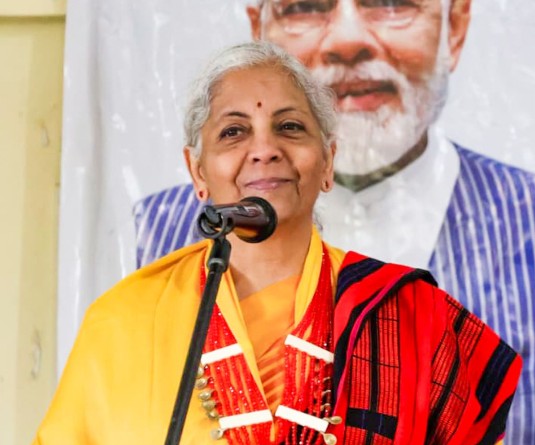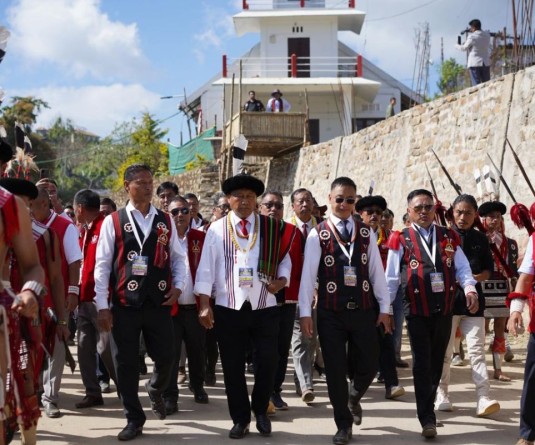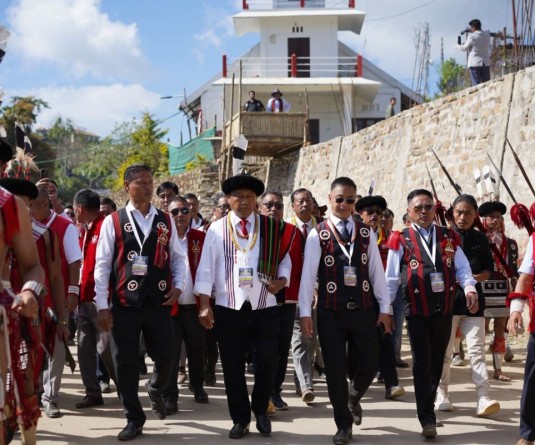
Party’s manifesto focuses on Indo-Naga political issue and development with justice
Our Correspondent
Kohima | February 8
The Janata Dal (United) Nagaland state unit today officially released its election manifesto with strong emphasis on the repeal of the Armed Forces Special Powers Act (AFSPA) and the Indo-Naga political issue.
The party manifesto stated that it would “honour the footstep of its founding father Jayaprakash Narayan and his love for the Naga people, by continuing to support an honourable solution to the Naga issue at the earliest.”
It stated that the Armed Forces Special Powers Act (AFSPA), “has become a tool of state abuse, oppression, and discrimination and has led to Human Rights violation in the North Eastern States especially in Nagaland.” The Armed Forces Special Powers Act allows armed forces to perpetrate abuses with impunity and has been used to violate fundamental freedoms for several decades, the JD (U) manifesto said. It added that the party stands for the repeal of the AFSPA.
JD(U) Nagaland president Senchumo (NSN) Lotha said the party will be contesting in 15 assembly constituencies in the districts of Kohima, Mokokchung, Zunheboto, Wokha, Mon, Tuensang and Kiphire.
The JD (U) shall contest the election with the theme “Development With Justice,” said Lotha while releasing the election manifesto here in the presence of JD (U) National Secretary Afaque Ahmad Khan, National Executive Member Aneel Hedge and state executive member Kitoho Rotoka. Lotha said that the JD (U) decided to go solo in this election “to prove ourselves to give Nagaland a party with a difference.”
On post poll alliance, he said the party will assess the situation after the election on issue basis. He said a vote for the JD (U) is a vote to fulfill the aspiration of the people of Nagaland for a developed state, a vote for the JD (U is for the empowerment of the villages, a vote for JD (U) is for the upliftment of the weaker section of the Naga people.
The manifesto stated that the JD (U) is dedicated to the task of building up a democratic secular and socialist state of India on Gandhian principles, inspiration from our rich heritage and the noble traditions of our struggle for national independence and individual liberty. It stressed on decentralization of economic and political power; and affirmed the right to peaceful and democratic dissent, which includes satyagraha or non-violent resistance.
“Our party’s leadership which is firmly rooted in the principles of socialism has always stood in solidarity with the people in need, viz minorities, ethnic groups, Tribal people, SC/STs, people belonging to backward castes, women and has been consistently fighting against all forms of discrimination,” stated the manifesto.
On the issue of illegal immigration, the party promised to ensure that the problem is curbed and suppressed to the lowest ebb by judiciously implementing the provisions of the Bengal Eastern Frontier Regulation 1873 (BEFR) Act in toto and other such relevant acts. It also called for a review of the Inner Line Regulation and addition of necessary provisions to it.
With regard to education, the JD(U) stressed on infrastructural development of all government schools; establishing colleges in all ADCs HQs and Higher Secondary schools in all SDOs HQs; special scholarships to students excelling in mathematics; insurance scheme for students studying outside the state for acute sickness and transportation of dead bodies; and constitution of an Education Commission for review of existing education policies.
The party manifesto also touched on rural development by affirming to work towards making the villages and its natives self-reliant through decentralisation of powers and policies of the government at the village level. Other features included promotion of backyard farming, assisting SHGs, and providing reasonable insurance cover to people living below poverty line in villages.
The JD (U) meanwhile called for fair means in availing job opportunities, establishment of small and medium industries, Special Financial Assistance for small business establishments, stopping business establishments owned, managed and controlled illegally by non-Nagas and making such opportunities available to capable Naga youths. It also spoke in favour of constituting a Staff Selection Board (SSB) in line with the Staff Selection Commission (SSC), for conduct of examinations to the vacant posts that do not fall within the purview of NPSC. It further favoured establishing a full-fledged Police Recruitment Board (PRB).
On road development, the party laid emphasis on efficient maintenance of the existing roads and taking up construction of new roads wherever relevant. Capable local contractors will be given preference by relaxing the qualifying norms for such works where they are not qualified without compromising the efficiency of the work quality, it added.
The manifesto also focused on the health sector by stating that party would ensure that all programmes reach the concerned people, and that all medical personnel would be made to compulsorily stay in their place of posting.
Nitish Kumar to campaign for JD(U) in Nagaland
Our Correspondent
Kohima | February 8
Bihar’s Chief Minister Nitish Kumar, who is also national president of JD (U) would campaign for JD (U) candidates as among the many star campaigners for general election to the 13th Nagaland Legislative Assembly. However, the date is yet to be finalized, according to JD(U) Nagaland state unit.
Other star campaigners, the list which was submitted to Election Commission of India, include RCP Singh, MP and general secretary (Org) JD (U) National, KC Tyagi, ex-MP and secretary general JD(U) National, Rajiv Ranjan Singh, Bihar’s minister for irrigation, JD(U) National secretary Afaque Ahmad Khan, national executive member Aneel Hedge, Sanjay Jhah, Ajay Alok, Sanjay Verma, Nikhil Mandal, Senchumo (NSN) Lotha, JD(U) Nagaland State unit president, Mhombemo Humtsoe, chairman election campaign committee, G. Kaito Aye (ex-minister), L. Temjen Jamir (Ex-MLA), Rhekum, Kitoho Rotoka, Thangliba Sangtam and Nlumsao Ngullie.






